| Listing 1 - 10 of 20 | << page >> |
Sort by
|
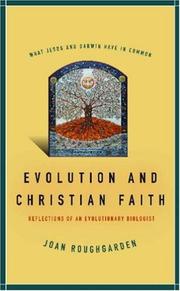
ISBN: 1597261572 1429495073 9781429495073 9781597262057 1597262056 1597260983 9781597260985 1597260983 9781597260985 9781597261579 Year: 2006 Publisher: Washington, DC Island Press
Abstract | Keywords | Export | Availability | Bookmark
 Loading...
Loading...Choose an application
- Reference Manager
- EndNote
- RefWorks (Direct export to RefWorks)
Evolution and Christian Faith distills complex arguments into everyday understanding. The result is an accessible and intelligent context for a Christian vision of the world that embraces science.
Evolution (Biology) --- Anti-evolutionism --- Antievolutionism --- Creationism --- Religious aspects --- Christianity.
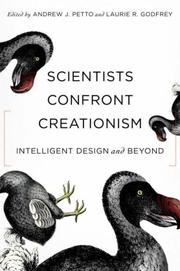
ISBN: 9780393330731 Year: 2007 Publisher: New York (N.Y.) : Norton,
Abstract | Keywords | Export | Availability | Bookmark
 Loading...
Loading...Choose an application
- Reference Manager
- EndNote
- RefWorks (Direct export to RefWorks)
anti-evolutionism --- America --- science and religion --- creationism --- politics
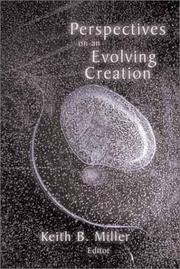
ISBN: 0802805124 Year: 2003 Publisher: Grand Rapids, Mich. Eerdmans
Abstract | Keywords | Export | Availability | Bookmark
 Loading...
Loading...Choose an application
- Reference Manager
- EndNote
- RefWorks (Direct export to RefWorks)
Cosmology --- Evolution. Phylogeny --- Christian dogmatics --- 215 --- Creationism --- Evolution (Biology) --- -Animal evolution --- Animals --- Biological evolution --- Darwinism --- Evolutionary biology --- Evolutionary science --- Origin of species --- Biology --- Evolution --- Biological fitness --- Homoplasy --- Natural selection --- Phylogeny --- Creation science --- Scientific creationism --- Modernist-fundamentalist controversy --- Bible and evolution --- Creation --- Intelligent design (Teleology) --- Godsdienst en wetenschap --- Religious aspects --- -Christianity --- Christianity --- Creationism. --- Christianity. --- -Godsdienst en wetenschap --- Animal evolution --- Religious aspects&delete& --- Anti-evolutionism --- Antievolutionism
Book
ISBN: 3495477144 9783495477144 Year: 1991 Volume: 18 Publisher: Freiburg Alber
Abstract | Keywords | Export | Availability | Bookmark
 Loading...
Loading...Choose an application
- Reference Manager
- EndNote
- RefWorks (Direct export to RefWorks)
Evolution (Biology) --- Philosophy. --- Religious aspects --- Christianity. --- -Evolution (Biology) --- -#GROL:SEMI-101<08> Gren 18 --- Animal evolution --- Animals --- Biological evolution --- Darwinism --- Evolutionary biology --- Evolutionary science --- Origin of species --- Biology --- Evolution --- Biological fitness --- Homoplasy --- Natural selection --- Phylogeny --- Philosophy --- -Christianity --- Research --- #GROL:SEMI-101<08> Gren 18 --- Religious aspects&delete& --- Christianity --- Anti-evolutionism --- Antievolutionism --- Creationism --- Evolution (Biology) - Philosophy. --- Evolution (Biology) - Religious aspects - Christianity.
Book
ISBN: 0810135906 0810135892 0810135884 Year: 2017 Publisher: Evanston, Illinois : Northwestern University Press,
Abstract | Keywords | Export | Availability | Bookmark
 Loading...
Loading...Choose an application
- Reference Manager
- EndNote
- RefWorks (Direct export to RefWorks)
In this study, Orr attributes to George Eliot an "incarnational aesthetic"' and reads her work in the light of it. Writing, she argues, might be said to have become the novelist's religion and "its most recognizable tenet was the living out of incarnation". Here, Orr examines Eliot's works more or less chronologically because of the deeply evolutionary quality to Eliot's career. In a personal sense, she is loathe to repeat herself and, while readers might recognize situations that she is revisiting, she always needs to believe in her own development as a writer. In her letters she repeatedly champions her first stories, for example, largely because they contain ideas that she doubts she"...can ever embody again." In a broader sense this is an important idea, however, in that her philosophy was grounded in a belief in the idea of progress. Orr engages in close readings of Eliot's writings to demonstrate how deeply the novelist's religious imagination operate in her fiction and poetry.
Evolution (Biology) --- Religious aspects --- Christianity. --- Eliot, George, --- Religion. --- Criticism and interpretation. --- Anti-evolutionism --- Antievolutionism --- Creationism --- Cross, Marian Evans, --- Evans, Marian, --- Eliot, Džordž, --- Ėliot, Dzhordzh, --- Cross, Mary Ann, --- Lewes, M. E. --- Lewes, Marian Evans, --- Elliŏtʻū, Choji, --- Eliyaṭ, Jārj, --- Evans, Mary Anne, --- אליוט, ג׳ַַורג׳ --- אליוט, ג׳ורג׳, --- עליאט, דזשארדזש --- עליאט, דזשארדזש, --- עליוט ג׳יארג׳, --- עליוט, גי׳ארג׳, --- עליוט, ג׳רארג׳,
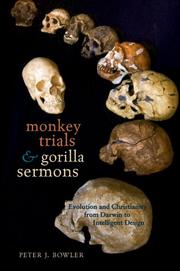
ISBN: 0674028600 9780674028609 9780674026155 0674026152 9780674032200 0674262301 0674032209 Year: 2009 Publisher: Cambridge, MA
Abstract | Keywords | Export | Availability | Bookmark
 Loading...
Loading...Choose an application
- Reference Manager
- EndNote
- RefWorks (Direct export to RefWorks)
Bowler doesn't minimize the hostility of many of the faithful toward evolution, but he reveals the less well-known existence of a long tradition within the churches that sought to reconcile Christian beliefs with evolution by finding reflections of the divine in scientific explanations for the origin of life. By tracing the historical forerunners of these rival Christian responses, Bowler provides a valuable alternative to accounts that stress only the escalating confrontation.
Creationism --- Evolution (Biology) --- Religion --- Philosophy & Religion --- Christianity --- Animal evolution --- Animals --- Biological evolution --- Darwinism --- Evolutionary biology --- Evolutionary science --- Origin of species --- Biology --- Evolution --- Biological fitness --- Homoplasy --- Natural selection --- Phylogeny --- Creation science --- Scientific creationism --- Modernist-fundamentalist controversy --- Bible and evolution --- Creation --- Intelligent design (Teleology) --- Religious aspects --- Religious aspects&delete& --- Creationism. --- Christianity. --- Anti-evolutionism --- Antievolutionism
Book
ISBN: 1108809235 1108767435 1108809111 1108487602 Year: 2020 Publisher: Cambridge : Cambridge University Press,
Abstract | Keywords | Export | Availability | Bookmark
 Loading...
Loading...Choose an application
- Reference Manager
- EndNote
- RefWorks (Direct export to RefWorks)
John R. Schneider explores the problem that animal suffering, caused by the inherent nature of Darwinian evolution, poses to belief in theism. Examining the aesthetic aspects of this moral problem, Schneider focuses on the three prevailing approaches to it: that the Fall caused animal suffering in nature (Lapsarian Theodicy), that Darwinian evolution was the only way for God to create an acceptably good and valuable world (Only-Way Theodicy), and that evolution is the source of major, God-justifying beauty (Aesthetic Theodicy). He also uses canonical texts and doctrines from Judaism and Christianity - notably the book of Job, and the doctrines of the incarnation, atonement, and resurrection - to build on insights taken from the non-lapsarian alternative approaches. Schneider thus constructs an original, God-justifying account of God and the evolutionary suffering of animals. His book enables readers to see that the Darwinian configuration of animal suffering unveiled by scientists is not as implausible on Christian theism as commonly supposed.
Theodicy. --- Evil, Problem of (Theology) --- God --- Permissive will of God --- Problem of evil (Theology) --- Good and evil --- Permissive will --- Will, Permissive --- Good and evil. --- Animals --- Suffering --- Evolution (Biology) --- Anti-evolutionism --- Antievolutionism --- Creationism --- Evil --- Wickedness --- Ethics --- Philosophy --- Polarity --- Religious thought --- Religious aspects --- Christianity.
Book
ISBN: 1316998355 1108642926 1108493696 Year: 2020 Publisher: Cambridge : Cambridge University Press,
Abstract | Keywords | Export | Availability | Bookmark
 Loading...
Loading...Choose an application
- Reference Manager
- EndNote
- RefWorks (Direct export to RefWorks)
Is original sin compatible with evolution? Many today believe the answer is 'No'. Engaging Aquinas's revolutionary account of the doctrine, Daniel W. Houck argues that there is not necessarily a conflict between this Christian teaching and mainstream biology. He draws on neglected texts outside the Summa Theologiae to show that Aquinas focused on humanity's loss of friendship with God - not the corruption of nature (or personal guilt). Aquinas's account is theologically attractive in its own right. Houck proposes, moreover, a new Thomist view of original sin that is consonant with evolution. This account is developed in dialogue with biblical scholarship on Jewish hamartiology and salient modern thinkers (including Kant, Schleiermacher, Barth, and Schoonenberg), and it is systematically connected to debates over nature, grace, the desire for God, and justification. In addition, the book canvasses a number of neglected premodern approaches to original sin, including those of Anselm, Abelard, and Lombard.
Thomas, Aquinas, --- Akʻvineli, Tʻoma, --- Akvinietis, Tomas, --- Akvinskiĭ, Foma, --- Aquinas, --- Aquinas, Thomas, --- Foma, --- Thomas Aquinas, --- Thomas, --- Tʻoma, --- Toma, --- Tomas, --- Tomasu, --- Tomasu, Akwinasu, --- Tomasz, --- Tommaso, --- Tʻovma, --- Тома, Аквінський, --- תומאס, --- תומס, --- اكويني ، توما --- Sin, Original --- Evolution (Biology) --- History of doctrines. --- Religious aspects --- Christianity. --- Anti-evolutionism --- Antievolutionism --- Creationism --- Ākvīnās, Tūmās, --- اكويني، توما, --- آکويناس، توماس,
Book
ISBN: 9780199812097 0199812098 Year: 2011 Publisher: New York, N.Y. Oxford University Press
Abstract | Keywords | Export | Availability | Bookmark
 Loading...
Loading...Choose an application
- Reference Manager
- EndNote
- RefWorks (Direct export to RefWorks)
In this long-awaited book, pre-eminent analytical philosopher Alvin Plantinga argues that the conflict between science and theistic religion is actually superficial, and that at a deeper level they are in concord.
Philosophy of nature --- Philosophy of science --- Religious studies --- Evolution (Biology) --- Naturalism --- Religion and science --- Christianity and science --- Geology --- Geology and religion --- Science --- Science and religion --- Materialism --- Mechanism (Philosophy) --- Philosophy --- Positivism --- Animal evolution --- Animals --- Biological evolution --- Darwinism --- Evolutionary biology --- Evolutionary science --- Origin of species --- Biology --- Evolution --- Biological fitness --- Homoplasy --- Natural selection --- Phylogeny --- Religious aspects&delete& --- Christianity --- Religious aspects --- Christianity. --- Anti-evolutionism --- Antievolutionism --- Creationism --- Evolution (Biology) - Religious aspects - Christianity. --- Naturalism - Religious aspects - Christianity.
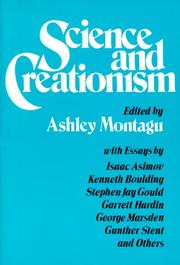
ISBN: 0195032527 0195032535 Year: 1984 Publisher: Oxford Oxford university press
Abstract | Keywords | Export | Availability | Bookmark
 Loading...
Loading...Choose an application
- Reference Manager
- EndNote
- RefWorks (Direct export to RefWorks)
Bible and evolution --- Creationism --- Evolution (Biology) --- -Animal evolution --- Animals --- Biological evolution --- Darwinism --- Evolutionary biology --- Evolutionary science --- Origin of species --- Biology --- Evolution --- Biological fitness --- Homoplasy --- Natural selection --- Phylogeny --- Creation science --- Scientific creationism --- Modernist-fundamentalist controversy --- Creation --- Intelligent design (Teleology) --- Evolution and the Bible --- Religious aspects --- -Christianity --- Christianity --- Biblical teaching --- Bible and evolution. --- Creationism. --- Christianity. --- -Religious aspects --- Evolution (Biology). --- Animal evolution --- Religious aspects&delete& --- Anti-evolutionism --- Antievolutionism
| Listing 1 - 10 of 20 | << page >> |
Sort by
|

 Search
Search Feedback
Feedback About UniCat
About UniCat  Help
Help News
News